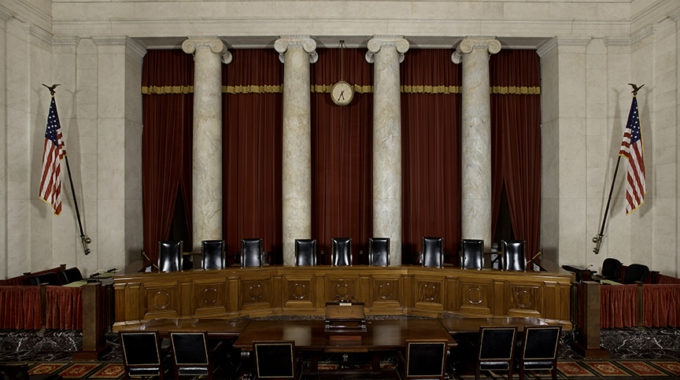Adapted from the writings of Dayan Yitzhak Grossman April 18, 2024 AP News reports: A…

Friend of the Court
May judges judge their friends?
Adapted from the writings of Dayan Yitzhak Grossman
August 27, 2020
A coalition of nine progressive groups has released a statement calling on Supreme Court Justice Brett Kavanaugh to recuse himself from an upcoming case involving Facebook due to his close friendship with the company’s vice president of public policy, Joel Kaplan. Kaplan had previously said that he had “known Brett and Ashley Kavanaugh for twenty years,” and that “they are my and my wife Laura’s closest friends in D.C. I was in their wedding; he was in ours. Our kids have grown up together.” In this article, we consider the halacha regarding the eligibility of a judge to preside over a case involving a personal friend.
Oheiv and sonei
The mishnah cites a dispute about whether a witness who is a friend (oheiv) of a litigant is eligible to testify in his case; R’ Yehudah rules that an oheiv who is a groomsman (shushbin) of the litigant is ineligible, whereas the Sages disagree and assert that Jews are not suspected of testifying falsely due to friendship.[1] From the Gemara’s discussion, it emerges that even the Sages agree that an oheiv is ineligible to judge his friend, and they only disagree regarding testifying.[2] Personal partiality will not induce a Jew to lie, but it will impair his judgment.
The Ri Migash explains (regarding the Gemara cited below) that there are actually two reasons why one should not judge his friend: he may be swayed in his favor, and if he escapes this pitfall and judges him fairly (and arrives at an adverse decision), he will then be guilty of repaying good with evil.[3]
The previous discussion seems to imply that the oheiv who is ineligible to serve as a judge is the shushbin that R’ Yehudah considers ineligible to testify. Elsewhere, however, the Gemara states categorically, “A person should not judge a case involving one whom he loves…as he will not find any fault in him,”[4] implying that any level of friendship is disqualifying. There are two approaches in the poskim to this apparent contradiction:
- The Rambam (as understood by many Acharonim) understands that the latter Gemara clarifies that the Sages indeed disqualify any oheiv from serving as a judge, not just the shushbin that R’ Yehudah disqualifies from testifying.[5] The Acharonim disagree, however, whether according to the Rambam the disqualification of an oheiv is only lechatchilah[6] or even b’dieved.[7]
- Many Ashkenazic Rishonim explain that while only a shushbin is absolutely ineligible (pasul) to serve as a judge, it is preferable that no oheiv should do so.[8] Within this school of thought that distinguishes between a shushbin and an ordinary oheiv, some maintain that even the latter is forbidden lechatchilah to serve as a judge,[9] while others maintain that this is only a chumra[10] or a midas chasidus.[11] Some understand this to actually be the view of the Rambam as well, that an oheiv gamur is absolutely pasul to serve as a judge, whereas an oheiv she’aino gamur is forbidden lechatchilah.[12] Additionally, some suggest that there may actually be three levels of oheiv: an oheiv gamur is pasul; an oheiv she’aino gamur is prohibited from judging lechatchilah; and someone with merely a slight partiality toward a litigant should refrain from judging him as a midas chasidus.[13]
Regarding the category of shushbin, many poskim assume that any close friend is in this category,[14] although there is a dissenting view.[15]
R’ Refael Yosef Chazan and his son R’ Rachamim Eliyahu Chazan both assert that a communal enactment that an appointed judge may judge even his relatives does not extend to allowing them to judge their enemies (whom they may not normally judge, similarly to their friends), since “this is not explicit” in the enactment.[16] The clear implication is that an enactment explicitly allowing judges to judge their enemies (or, presumably, their friends) would be valid.
Conclusion
A judge is completely disqualified from judging his shushbin, and according to most poskim this extends to any oheiv gamur. A judge should also not judge even an oheiv she’aino gamur, although some consider this obligatory (lechatchilah), while others consider it only a chumra or midas chasidus.
It appears, however, that a community has the right to allow appointed judges to judge their friends. Furthermore, it is unclear to me how these halachos apply to a case where the judge’s friendship is not with the litigant himself, but merely to a senior officer of a corporate litigant.
[1]Sanhedrin 27b and Rashi there.
[3]Mishlei 17:13. Shu”t Ri Migash siman 202. Cf. Orach Mishpat (Chazan) ibid. os 21; Halacha Pesukah ibid. n. 233.
[5]Hilchos Sanhedrin 23:6; Kesef Mishneh ibid. and Beis Yosef C.M. siman 7; Radvaz ibid.; Shu”t Oholei Yaakov siman 49 p. 88a. Cf. Kesef Mishneh Hilchos Eidus 16:6 and Lechem Mishneh ibid.
[6]Beis Yosef ibid.
[7]Oholei Yaakov ibid.; Lechem Mishneh Hilchos Eidus 16:6; Shu”t Toras Emes siman 97. Cf. Shu”t Chaim Sha’al cheilek 2 siman 42 os 38, and Birkei Yosef ibid. os 18 at length.
[8]Tosafos Kesubos ibid.; Rosh and Mordechai, cited in Beis Yosef ibid.
[9]Rosh ibid.
[10]Tosafos ibid.; Mordechai, cited in Shu”t Maharik shoresh 21.
[11]Maharik ibid.
[12]Shu”t Maharam Lublin siman 63. Oholei Yaakov ibid. proposes but rejects a similar interpretation of the Rambam. Cf. Orach Mishpat (Analik) ibid. s.v. Rama v’yeish omrim debeson’o mamash.
[13]Maharam Lublin ibid. s.v. Ha’amnam. He proposes this as the view of the Tur, but he proceeds to note that Tosafos seems to acknowledge only two categories.
[14]Tur ibid.; Rama to Shulchan Aruch ibid. se’if 7; and cf. Bach ibid.
[15]Kenesses Hagedolah ibid. Hagahos Beis Yosef end of os 15. Cf. Shu”t Shevus Yaakov cheilek 1 siman 141; Birkei Yosef ibid. os 19.
[16]Chikrei Lev C.M. cheilek 2 siman 24 p. 32a s.v. umilvad; Orach Mishpat (Chazan) ibid. os 14.





